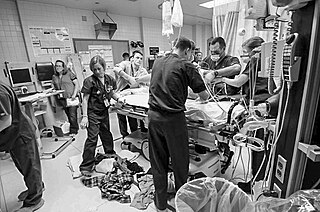
Emergency medicine is the medical speciality concerned with the care of illnesses or injuries requiring immediate medical attention. Emergency physicians continuously learn to care for unscheduled and undifferentiated patients of all ages. As first-line providers, in coordination with Emergency Medical Services, they are primarily responsible for initiating resuscitation and stabilization and performing the initial investigations and interventions necessary to diagnose and treat illnesses or injuries in the acute phase. Emergency physicians generally practise in hospital emergency departments, pre-hospital settings via emergency medical services, and intensive care units. Still, they may also work in primary care settings such as urgent care clinics.
A subpoena duces tecum, or subpoena for production of evidence, is a court summons ordering the recipient to appear before the court and produce documents or other tangible evidence for use at a hearing or trial. In some jurisdictions, it can also be issued by legislative bodies such as county boards of supervisors.
Medical malpractice is professional negligence by act or omission by a health care provider in which the treatment provided falls below the accepted standard of practice in the medical community and causes injury or death to the patient, with most cases involving medical error. Claims of medical malpractice, when pursued in US courts, are processed as civil torts. Sometimes an act of medical malpractice will also constitute a criminal act, as in the case of the death of Michael Jackson.

Non-economic damages caps are tort reforms to limit damages in lawsuits for subjective, non-pecuniary harms such as pain, suffering, inconvenience, emotional distress, loss of society and companionship, loss of consortium, and loss of enjoyment of life. This is opposed to economic damages, which encompasses pecuniary harms such as medical bills, lost wages, lost future income, loss of use of property, costs of repair or replacement, the economic value of domestic services, and loss of employment or business opportunities. Non-economic damages should not be confused with punitive or exemplary damages, which are awarded purely to penalise defendants and do not aim to compensate either pecuniary or non-pecuniary losses.

The Association of American Physicians and Surgeons (AAPS) is a politically conservative non-profit association that promotes conspiracy theories and medical misinformation, such as HIV/AIDS denialism, the abortion-breast cancer hypothesis, and vaccine and autism connections. The association was founded in 1943 to oppose a government attempt to nationalize health care. The group has included notable members, including American Republican politicians Ron Paul, Rand Paul and Tom Price.
Defensive medicine, also called defensive medical decision making, refers to the practice of recommending a diagnostic test or medical treatment that is not necessarily the best option for the patient, but mainly serves to protect the physician against the patient as potential plaintiff. Defensive medicine is a reaction to the rising costs of malpractice insurance premiums and patients’ biases on suing for missed or delayed diagnosis or treatment but not for being overdiagnosed.
The Medical Injury Compensation Reform Act (MICRA) of 1975 was a statute enacted by the California Legislature in September 1975, which was intended to lower medical malpractice liability insurance premiums for healthcare providers in that state by decreasing their potential tort liability.
Health law is a field of law that encompasses federal, state, and local law, rules, regulations and other jurisprudence among providers, payers and vendors to the health care industry and its patients, and delivery of health care services, with an emphasis on operations, regulatory and transactional issues.
Sham peer review or malicious peer review is a name given to the abuse of a medical peer review process to attack a doctor for personal or other non-medical reasons. The American Medical Association conducted an investigation of medical peer review in 2007 and concluded that while it is easy to allege misconduct and 15% of surveyed physicians indicated that they were aware of peer review misuse or abuse, cases of malicious peer review able to be proven through the legal system are rare.

Tort reform refers to changes in the civil justice system in common law countries that aim to reduce the ability of plaintiffs to bring tort litigation or to reduce damages they can receive. Such changes are generally justified under the grounds that litigation is an inefficient means to compensate plaintiffs; that tort law permits frivolous or otherwise undesirable litigation to crowd the court system; or that the fear of litigation can serve to curtail innovation, raise the cost of consumer goods or insurance premiums for suppliers of services, and increase legal costs for businesses. Tort reform has primarily been prominent in common law jurisdictions, where criticism of judge-made rules regarding tort actions manifests in calls for statutory reform by the legislature.

Donald M. Berwick is a former Administrator of the Centers for Medicare and Medicaid Services (CMS). Prior to his work in the administration, he was President and Chief Executive Officer of the Institute for Healthcare Improvement a not-for-profit organization.
The California Medical Association (CMA) is a professional organization based in California that advocates on behalf of nearly 50,000 physicians in legislative, legal, regulatory, economic, and social issues. The organization was founded in 1856 and is a member of the American Medical Association.
The healthcare reform debate in the United States has been a political issue focusing upon increasing medical coverage, decreasing costs, insurance reform, and the philosophy of its provision, funding, and government involvement.
There were a number of different health care reforms proposed during the Obama administration. Key reforms address cost and coverage and include obesity, prevention and treatment of chronic conditions, defensive medicine or tort reform, incentives that reward more care instead of better care, redundant payment systems, tax policy, rationing, a shortage of doctors and nurses, intervention vs. hospice, fraud, and use of imaging technology, among others.
The Independent Payment Advisory Board, or IPAB, was to be a fifteen-member United States Government agency created in 2010 by sections 3403 and 10320 of the Patient Protection and Affordable Care Act which was to have the explicit task of achieving specified savings in Medicare without affecting coverage or quality. Under previous and current law, changes to Medicare payment rates and program rules are recommended by MedPAC but require an act of Congress to take effect. The system creating IPAB granted IPAB the authority to make changes to the Medicare program with the Congress being given the power to overrule the agency's decisions through supermajority vote. The Bipartisan Budget Act of 2018 repealed IPAB before it could take effect.

Choosing Wisely is a United States-based health educational campaign, led by the ABIM Foundation, about unnecessary health care.
Laurence Tancredi is a psychiatrist/lawyer, and Clinical Professor of Psychiatry at New York University School of Medicine. He was formerly the Kraft Eidman Professor of Medicine and the Law at the University of Texas Health Science Center at Houston. A graduate of the University of Pennsylvania School of Medicine, the Yale Law School, and psychiatric fellowship at Yale Medical School, Tancredi is the author or coauthor of numerous articles and several books on topics of law, ethics and psychiatry, including Dangerous Diagnostics: The Social Power of Biological Information and When Law and Medicine Meet: A Cultural View. His most recent book is Hardwired Behavior: What Neuroscience Reveals about Morality.

Los Angeles County Medical Association (LACMA) is a professional organization representing physicians from every medical specialty and practice setting as well as students, interns and residents. The organization was founded in 1871 and is a constituent of the California Medical Association (CMA). It advocates quality care for all patients and provides services to meet the professional needs of its physician members. The group serves to represent its professional members in public policy, government relations, and community relations. LACMA, together with CMA physicians, strives to preserve and protect the noble pursuit of healthcare delivery.

Medical malpractice is a legal cause of action that occurs when a medical or health care professional, through a negligent act or omission, deviates from standards in their profession, thereby causing injury or death to a patient. The negligence might arise from errors in diagnosis, treatment, aftercare or health management.
Separation of prescribing and dispensing, also called dispensing separation, is a practice in medicine and pharmacy in which the physician who provides a medical prescription is independent from the pharmacist who provides the prescription drug.








